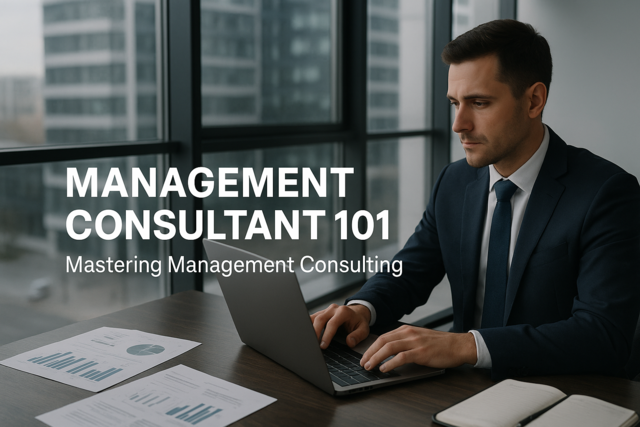The key consultant characteristics include professionalism, reputation, judgment, good listening and time management skills, and effective communication. When other consultants were asked the skills they feel are most valued, they listed: getting along with clients, technical knowledge, skill in structuring tasks, industry experience, and a commitment to the client.
Best practices are always appreciated, because they are market-tested, repeatable, and time-saving. By continually improving your business and applying others' best practices to your practice, you are able to perform in your business at a higher level.
Additional Ideas
These are some additional ideas to use when you are outlining client activity and promoting your consulting business.
-
Never claim experience, achievements, or qualifications that you cannot substantiate.
-
Notify your client immediately if you perceive any potential conflict of interest.
-
Always be clear who you report to for the client organization during your time as a consultant.
-
Use due diligence regarding the credentials of your potential clients.
-
Never work on commission-based fees; work on hourly or set rates. Working on a commission basis can lead to ethical concerns.
-
If you intend to maintain the copyright for work, be sure this is included in your written contract.
-
Ensure you include the responsibilities for data protection in your written contracts.
-
Never guarantee results.
-
Always make fees and expenses clear in your proposal.
-
Ensure that your client understands the scope of your consulting service.
-
Ensure that your client understands what input might be required from them.
-
Never criticize the work of other consultants.
Proactive interactions
Clients appreciate proactive interactions, and they like the rapidity of interactions. Here are basic client satisfaction tips that you can follow:
-
Interpret their needs by distinguishing and differentiating between what they say, what they do, and what they truly need, by communication, and synthesizing their information.
-
Follow-up on loose ends related to your actions and solutions. No one appreciates individuals who do not follow through with what they say, or follow up when they say they will.
-
Make sure you are accessible by multiple communication methods to ensure speed of service -- including email, phone, voice mail, or instant messaging.
-
Be respectful; clients prefer to work with consultants they feel value and respect them, and earn their trust.
-
Stay focused on approaches that are data driven and produce the most value to the client.
-
Being easy to work with means that clients like consultants who are approachable, and find it so easy to work with you, that it would be more work to work with other consulting firms.
-
Personalize your experience with each client by sending them personal messages to form a bond, and let them know you are an individual who takes the extra step to build client relationships.
Additional contract additions
As you engage in business, always ensure that you are working under your contract to protect your business interests and reduce liability for your company. A legally binding contract should be signed by both parties. Be sure to include a section on acceptance criteria, which will contain the client's expectations of your consulting deliverables, including the measurable quality requirements. Include a risk assessment that explains the anticipated risk, which may potentially undermine the consulting project. Include your assumptions for the consulting project, as well. By including these, you are clear on what it will take for the client to accept your work, the risks that may be involved, and assumptions, prior to engaging in the consulting work. This ensures that these are known in the forefront. They may not totally prevent problems, but they are known in advance. Typically, if you are referring back to assumptions, previously anticipated risk, and the acceptance criteria, you may wind up with more problems dealing with the client than you hoped for.
Preparing for client interviews
The best consultants align each consulting opportunity to achieve the best results through transparency, having a better understanding of their clients, reducing barriers, reducing risk of effectively managing their recommendations, and accelerating the results for their clients.
Here are some tips that clients will judge you by, or will be observing when they are searching for potential consultants. If you are invited to a consultant interview based on your proposal, these are some potential questions clients may ask, and observations they may make.
-
They may outline their problem and ask how you would proceed.
-
They will ask about your competence.
-
They will observe your personality.
-
They will observe how well you listen to what is being said.
-
They will observe what questions you ask.
-
They will observe how realistic the solutions you present are.
In order to perform the best for client interviews, you must best understand client expectations and how you will develop your service performance. The quality of your customer service is dependent largely on your ability to meet their expectations in terms of quality, efficiency, results, and price. Your quality is determined by your client's perception of your work. Continually refine your business, your personal expertise, and competence -- and that of your employees.
Improving referral generation � Business growth mindset
Consulting companies are always striving to improve their client base. This is a quick list to help you generate some referrals, in case you hadn't thought of these:
|
� Your current clients |
� Your past clients |
� Hobby groups |
� Trade associations |
|
� Subcontractors |
� Social contacts |
� Family |
� Extended family |
|
� Professional contacts, such as dentists, accountants, attorneys, or designers |
� Charities |
� Recreation involvement |
|
Research methodology improvements
As a consultant, the best way to improve your business is to improve your overall effectiveness. Take time to review technical publications in your area of expertise, and in consulting forums. Technology- and knowledge-based applications change over time, as there are always new and better ways to accomplish the task. Consulting is no different. Review white papers for consulting tips and other consulting proposals to determine ways you can make improvements in your own.
The best consultants continually refine their operations in terms of execution, which include developing better fact-finding methods, learning about, and applying, diagnostic tools, improving validation methods for recommendations, and developing better quality contingency plans. As you progress in your consulting business, you develop your own thoughts on how each company views change management. This will allow you to refine your strategy development processes, team-building skills, meeting management, and facilitation skills.
The key problem-solving approaches in consulting include change management, business process re-engineering, which redesigns work to better support the company's mission, information technology strategy development, earned value analysis, conflict management and benchmarking. In order to be one of the best consultants you must continually redesign how you serve your clients in each of these areas.
Continue to learn more about dealing with client culture, building of relationships, coaching and mentoring, managing conflict, and ethical behavior. You should also build on your ability to manage processes. This includes your ability to plan, organize, lead, control, and to improve organizational behavior.
The highest range of consulting companies are there for a reason; this is based on experience, research, and the ability to design new, innovative solutions to clients problems. Many consulting organizations offer patented types of services -- a collection of tools and techniques they have developed over time, which they believe are significantly different than other approaches used in the consulting.
Join a consulting professional group
There are a number of professional organizations, you may have interest in joining, which include the Institute of Management Consultants and the Association of Professional Consultants. There are a number of benefits to joining a consulting group. Often the cost is low, the benefits huge. Consulting organizations can help you improve your business through a number of offerings and opportunities which take the legwork out of the consulting business these include:
-
Developing comprehensive marketing packages
-
Website support tips and ideas
-
Template and documentation, including contracts and forms
-
White papers and best practices
-
Insurance discounts
-
Information on seminars and conferences
-
Recommended books and readings
-
Consultant certification details
-
Body of knowledge information
-
Networking opportunities
Other good ideas
-
Know your top 10 competitors and what differentiates them from one another. Understand their strengths and weaknesses and the basics of each company, including the number of employees and their overall revenue.
-
Establish Google alerts for your clients and your competition. This will feed you the latest information on your clients and potential competition, based on keywords that you supply. Any time any information is posted on the Internet for your competition or your clients, you will receive a Google alert.
-
Keep the contact information readily available for all of your clients, past and present, including e-mail addresses, telephone numbers, and secretaries. You never know when you're going to need them; having several layers of contacts will prove handy. This will also help you to keep clients and relevant personnel straight.
-
Be familiar with the profiles of the executives for the company you are working for, including the CEO and senior management, to better help you understand the client.
-
Know the basic financial information for your client, such as their gross profit, and overall revenue. Memorizing basic information will go a long way in informal discussions with your client.
-
Stay current on innovative technology, including technological industry-related keywords.
-
When initiating a new project with the client, use the Internet to search for existing similar projects, especially projects related to your client. These will help provide insight into the thought processes of your client.
-
Provide a document portal for you and the client to use as the consulting process progresses. This will be a repository of documents related to the project to share what it is complete, and build a historical base.
-
Be prepared for technical failures and other issues that may prevent you from consulting remotely, including additional power cords, electronic cables, computer mice, USB drives, extra printer paper, projector light bulbs and printer cables.
-
Other ways consultants become the best in their industry is by partnering with a fellow consultant for short period of time, to compare their business operations with those of another consulting company. It is surprising what you may learn, if you find an opportunity to shadow a fellow consultant at their company. Many times they are willing to share some of their consulting methodologies, but rarely their trade secrets.
-
Similar to shadowing, many consultants seek industry mentors. This allows them to develop a relationship with a professional who has the same career aspirations of managing a consulting company as you do. Mentors are typically seasoned in the consulting industry and have a number of stories they can tell you of client interactions and the do's and don'ts of the industry.
-
Be sure you prioritize high value tasks and low value tasks to determine which tasks are easy or hard, and which offer you the most benefits and value.
-
Seasoned consultants also recommend that you develop the appropriate work/life balance within the management of your consulting business. In general, managing your own business equates to working longer hours to develop your passion; it can also lead to frustration and burnout. Set personal boundaries for the number of hours you work and take breaks to decrease your stress level, but also to increase your performance and effectiveness in consulting, and in business management.
-
When you hire contracted employees or full- or part-time employees for your business, consider how well these individuals will work together as a team. As a small business owner, you do not need to complicate matters by hiring a dysfunctional team that impedes progress in business growth. Hiring additional employees can add to the complementary effect in a positive way, by combining diverse viewpoints over business experiences and in interaction with clients. Some consultants have had interactions where they do not mesh with the client, but they do have a person on their team who has an excellent rapport in conducting business with the client. This is a win-win.
-
Other consultants say to be sure to take calculated risks. In order for your consulting business to thrive, you must take on some element of risk. Without risk, there are no rewards. Develop your opportunities and ventures carefully to minimize your risks.
As a business consultant, you have three key factors you have to manage; these include designing the right solutions, delivering them with efficiency at the best cost, and communication. Communication is one of the most important aspects of your business.
Summary Reminders and Takeaways
It takes the average consultant years to develop the perfect methodology to develop the best services. In this article, we provided you information on how you can be the best consultant through the use of many consulting best practices. The key consultant characteristics include professionalism, reputation, judgment, good listening, good time management, and good communication.
Best practices are always appreciated, because they are market tested, repeatable, and time-saving. By continually improving your business, and reviewing others' best practices, you are able to perform in your business at a higher level.
Here are some key best practices recommended for use in your business: Never claim experience, or qualifications you cannot substantiate; notify your client of any conflicts of interest; always perform due diligence on clients so you understand their background or any issues that may be -- or have been -- in the news; ensure you protect data; never guarantee results, and never criticize the work of other consultants.
Clients prefer consultants that are proactive and who can interpret their needs, perform follow-up, make themselves accessible, are respectful with client interactions, focused on approaches that are data driven, easy to work with, and who personalize their services.
Make sure that your contracts include acceptance criteria that elaborates on the deliverables and quality requirements, a risk assessment that explains the anticipated risk, and your assumptions for the consulting project. This will make sure that you and the client are clear prior to engaging in the consulting work.
Many client organizations perform a consultant interview for selecting the final consultant to perform the job. The potential questions they may ask, and observations they may make of you, include asking you how you would proceed with resolving the problem, asking about your competence, observing your personality, observing your listening skills, and determining how realistic the solutions you present are.
Operate in the business growth mindset by continually growing your list of referrals. You also want to research consulting methodology improvements. The better you can execute projects, the more services you can provide at a higher level. Refining your operations should include developing better fact-finding methods, learning about and applying diagnostic tools, improving validation methods for recommendations, and developing better quality contingency plans. A final recommendation is to know your top 10 competitors and their strengths and weaknesses. Use these to develop your methodology.




























